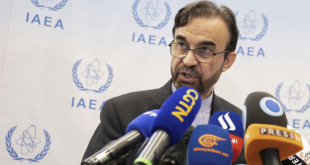RIYADH (Reuters) — Iran asked Saudi Arabia to help ease tensions between the Islamic republic and the United States as Washington held out the possibility of “engagement” with Tehran if it changed tack in Iraq.
A letter was delivered by Tehran’s chief nuclear negotiator to the Saudi king from Iran’s supreme leader Ayatollah Ali Khamenei and President Mahmoud Ahmadinejad, a Saudi official said on Monday. The official said Iran wanted Saudi leaders to relay a goodwill message to Washington.
Iran would like key regional US ally Saudi Arabia to “help bring opinions together” between Iran and the United States, the official said, but gave no more details.
The letter, which comes at a time of rising tension over Iran’s role in Iraq and Tehran’s nuclear programme, came hours before US Secretary of State Condoleezza Rice arrived in Saudi Arabia for talks expected to focus on Iraq and efforts to revive Israeli-Palestinian peacemaking.
It also follows growing criticism in Iran of Ahmadinejad’s approach of railing publicly against the West which more moderate politicians say has stoked fears abroad.
US forces are holding five Iranians after raiding an Iranian government office in Erbil last week — the second such operation in recent weeks.
US President George W. Bush has ordered more US troops to Iraq, ignoring recommendations by a US study group calling on Washington to deal directly with Syria and Iran, with whom it broke off ties in 1979, to help rein in violence in Iraq.
Instead, Bush has vowed to stop what he said was Iran’s role in fomenting violence in Iraq, and US Ambassador to Iraq Zalmay Khalilzad said an important part of Bush’s strategy was to stop “hostile regional interference”, notably by Iran and Syria. “We’re going after their networks in Iraq,” he said.
US Defence Secretary Robert Gates on Monday described Tehran’s stance on Iraq as “very negative” but said opportunities for engagement may arise when the Iranians are prepared to play a “constructive” role in dealing with security problems in Iraq.
“They’re doing nothing to be constructive in Iraq at this point,” he told a news conference in Brussels, also pointing to Iran’s backing for Shiite group Hizbollah, which is trying to topple the US-backed Lebanese government.
New pragmatism?
As tension mounts, Iran’s more pragmatic politicians from the liberal and moderate conservative camps have urged a more cautious Iranian approach and, heartened by the December polls, have accused Ahmadinejad of provoking confrontation.
Ahmadinejad does not have the final say in the Islamic republic, where ultimate authority lies with Khamenei, but analysts say the president has encouraged a tougher line with the West since he came to office in 2005.
“In the future, I think the hands of the pragmatist elites, little by little, may become more powerful than before the [December] elections,” said political analyst and university professor Hamidreza Jalaiepour, citing figures like Iran’s chief nuclear negotiator Ali Larijani, who was defeated by Ahmadinejad in the 2005 presidential race.
Gulf Arab countries said last month they would go ahead with their own civilian nuclear energy programme, in what some observers have said was a Saudi message to Washington that a nuclear arms race will ensue if Tehran is not checked.
Iran says its nuclear energy is for peaceful purposes but the United States says it is a covert arms programme.
US-allied Arab countries including Saudi Arabia acquiesced in Washington’s plan to invade Iraq in 2003, offering some public words of opposition. But Gulf countries fear an Iran war could expose them to greater military and environmental risks.
Saudi Foreign Minister Saud Al Faisal said at the weekend he hopes to hear clarifications from Rice on Bush’s new strategy, which Riyadh fears will lead to US troops leaving Iraq prematurely, allowing Iran to gain more influence and leaving minority Sunnis at the mercy of Shiite factions.
 Eurasia Press & News
Eurasia Press & News


